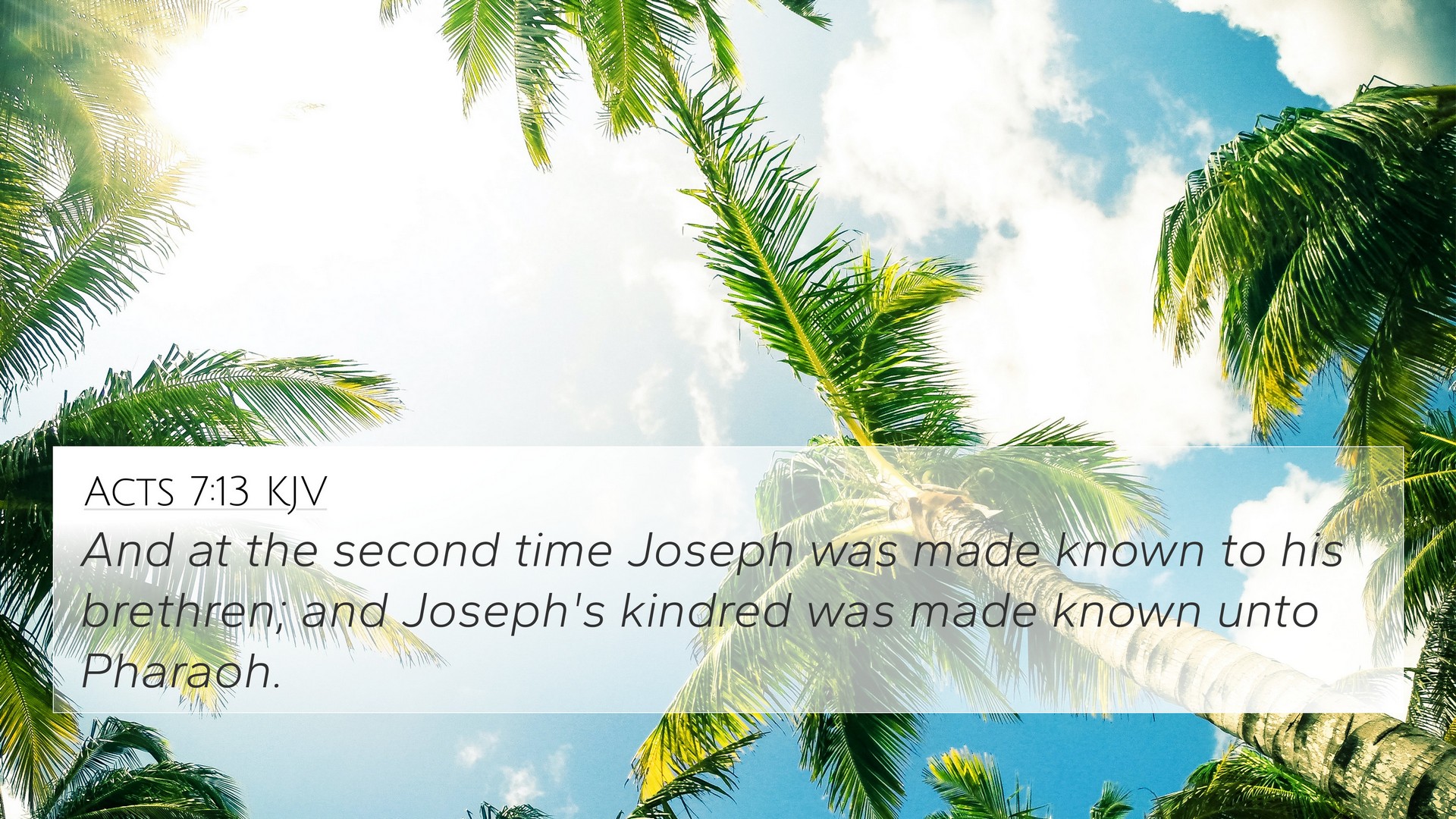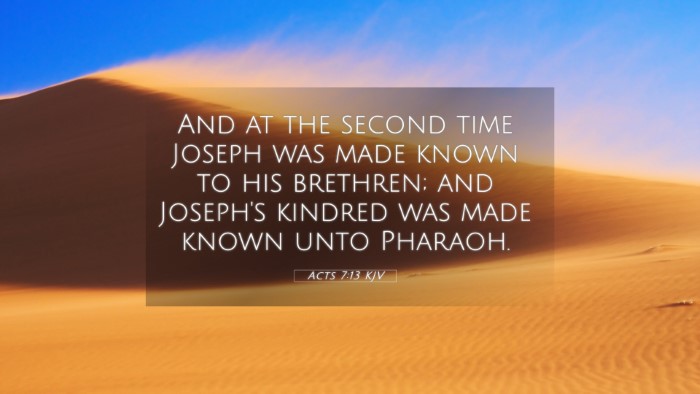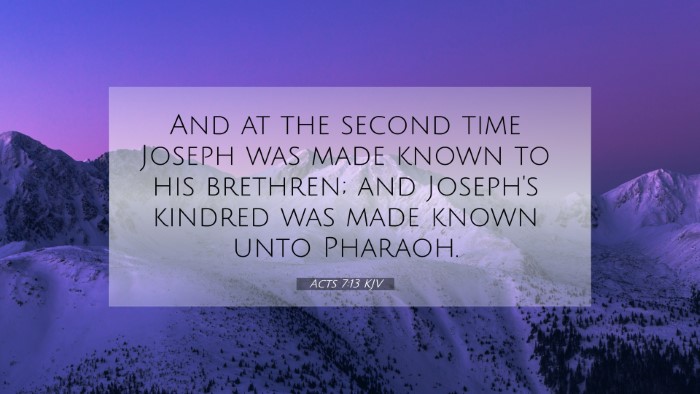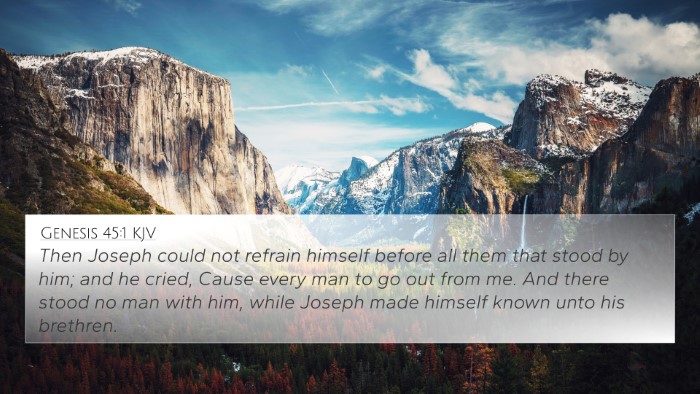Understanding Acts 7:13
The verse Acts 7:13, part of Stephen's speech before the Sanhedrin, highlights a pivotal moment in the history of Israel, focusing on the connection between Joseph and his brothers, and their eventual recognition of their ties.
Verse Text
"And at the second time Joseph was made known to his brethren; and Joseph's kindred was made known unto Pharaoh." (Acts 7:13)
Summary of Meaning
The essence of Acts 7:13 revolves around themes of revelation, reconciliation, and God's providence. It underscores how, upon their second encounter, Joseph unveiled his identity to his brothers, a significant event that paved the way for the family's later settlement in Egypt. This moment reflects the broader narrative of God’s plan for His people, demonstrating how He orchestrates events for the fulfillment of His promises.
Commentary Insights
-
Matthew Henry:
Henry emphasizes the transformative nature of revelation in this passage, noting that Joseph's brothers, initially unaware of his status, symbolize humanity's blindness to God's work in their lives. When Joseph declared his identity, it was not just a personal revelation but a divine moment that pointed to the larger plan of salvation.
-
Albert Barnes:
Barnes comments on the significance of the "second time," indicating a moment of realization and recognition for Joseph's brothers, which serves as a metaphor for greater spiritual truths. He elaborates on the importance of comprehension and acknowledgment of God's sovereign actions, leading us to a deeper understanding of His work in our lives.
-
Adam Clarke:
Clarke draws connections to the narrative of Joseph's trials and tribulations, emphasizing the lessons learned through suffering and the mistaken perceptions his brothers held. He highlights that once Joseph revealed himself, it marked a transition into a new chapter for both the family and the nation of Israel, as they began to grasp the extent of God's favor and plan.
Bible Verse Cross-References
This verse connects to several other scriptures that enhance its understanding and thematic depth:
- Genesis 37:28: Joseph sold into slavery, foreshadowing his future rise in Egypt.
- Genesis 41:46: Joseph’s elevation to power in Egypt lays the groundwork for his reunification with his family.
- Genesis 42:6: Joseph's position as governor explains the initial interactions with his brothers.
- Genesis 45:1-3: The moment of revelation when Joseph finally discloses his identity to his brothers.
- Exodus 1:1-5: The establishment of the Israelites in Egypt due to Joseph’s foresight during the famine.
- Hebrews 11:22: Joseph’s faith and how it influenced subsequent generations reflecting God’s promises.
- Romans 8:28: God's sovereignty in weaving all situations for good; mirrors Joseph's life story.
Thematic Connections
Acts 7:13 embodies key themes within the Bible:
- Revelation: The unveiling of Joseph to his brothers parallels God's revelation of Himself to humanity.
- Familial Reconciliation: The theme of forgiveness and restoration among family members highlights the Gospel's message of reconciliation.
- Divine Providence: The orchestration of events leading to Joseph’s rise serves as a testament to God's overarching plan.
- Faithfulness: Joseph’s faithfulness through adversity illustrates the importance of trusting God’s plan.
Cross-Referencing Biblical Texts
By utilizing tools for Bible cross-referencing, one can explore deeper insights into the interconnectedness of scriptures:
- Utilize a Bible concordance to find related passages.
- Implement a Bible cross-reference guide for comprehensive study.
- Engage in cross-reference Bible study methods to reveal the richness of biblical themes.
- Explore Bible chain references to understand the flow of scriptural narratives.
Application of Cross-Referencing
Finding connections through cross-referencing can deepen the understanding of specific verses:
- What verses are related to Acts 7:13?
- How do Acts 7:13 and Genesis 45:1 connect?
- Find cross-references for Joseph’s story in both Old and New Testaments.
- Analyze similarities between Acts 7:13 and Romans 8:28 as they reflect themes of providence.
Conclusion
Acts 7:13 serves as a vital juncture in both the life of Joseph and the narrative of Israel, embodying key themes of revelation, reconciliation, and God's providential care. Through careful cross-referencing of related scriptures, one can uncover a rich tapestry of interconnected truths that illuminate God's unwavering purpose in history and in our lives.




